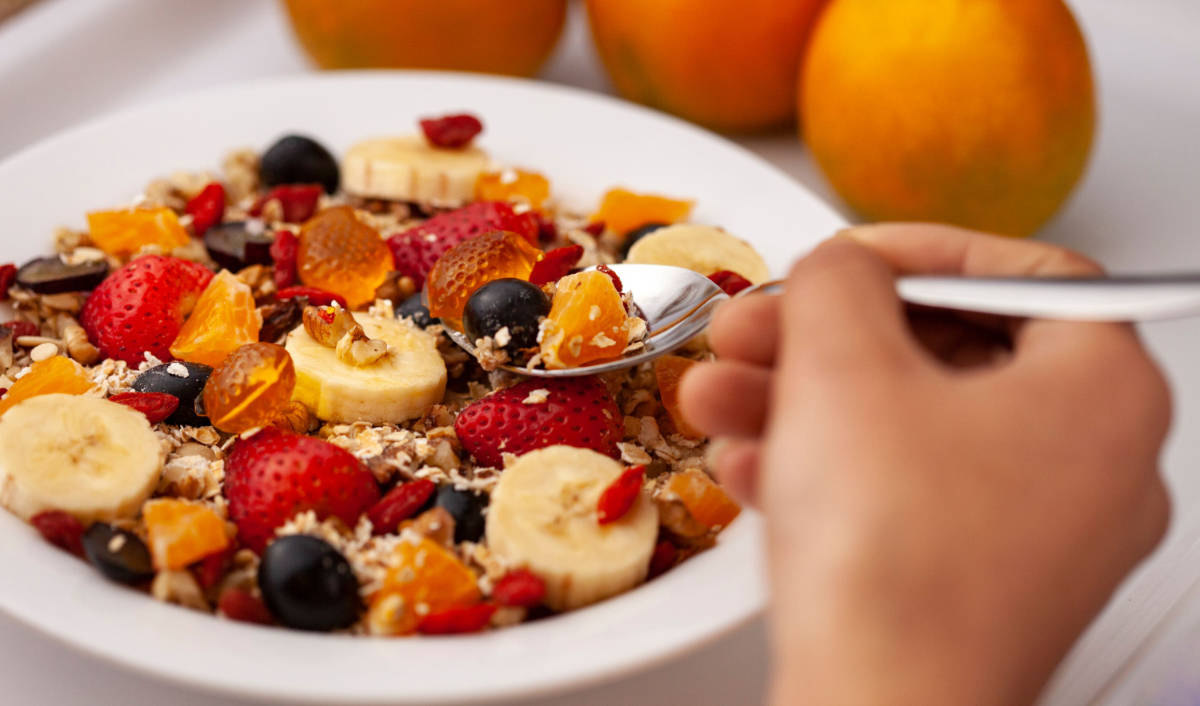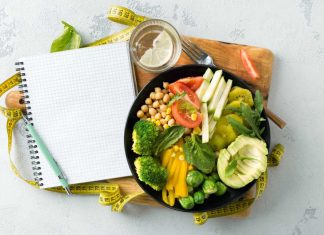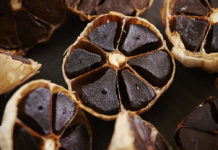Dietary fibre isn’t exactly the most exciting term in the wellness world. Unlike trendy buzzwords like keto and paleo, it can conjure up images of tasteless grains, and the type of brown-bread sandwiches you hated as a kid.
But fibre it isn’t as bland as you think – and there’s good reason why all of us should take conscious steps to make sure we’re getting enough.
A recent study published in The Lancet study found people who routinely eat lots of fibre have significantly lower rates of diseases like heart disease, stroke and type 2 diabetes, compared with those who consume much lower amounts. Yet, the British Nutrition Foundation says that in the UK, most people still don’t fall within the government guidelines for daily fibre intake.

So, why is fibre so important, and what can we do to make sure we’re regularly topped up? We asked some health experts for their top tips…
How much fibre should I be eating?
“We recommended that adults in the UK eat 30g of fibre a day, but on average we’re eating much less – about 20g per day,” says Bridget Benelam, nutrition communications manager at The British Nutrition Foundation (nutrition.org.uk).
It can be tricky to tell if you’re deficient in fibre, but she says the biggest clue will often be your bowel movements. “A lack of fibre can affect different people in different ways, but suffering from constipation can be a major indicator that you are not getting enough.”
It’s not all about toilet habits though. “Even if you’re not experiencing any symptoms, it’s worth thinking about upping your fibre intakes,” Benelam adds, “as we know that fibre is really important for our long-term health.”
What exactly is fibre?
Dietary fibres are found in the indigestible parts of plants, such as the leaves, stems and roots. “Fibre is basically carbohydrates that are found in plant-based foods, like fruit, vegetables, pulses and grains,” explains Dr Naveen Puri, lead physician at Bupa Health Clinics (bupa.co.uk).
Puri explains that fibre is unique because it stays in your digestive tract for nearly the entire digestive process. “Fibre isn’t broken down and absorbed in your small bowel like other types of food, but passes undigested into your large bowel. In this way, it helps to keep your digestive system in good working order.”
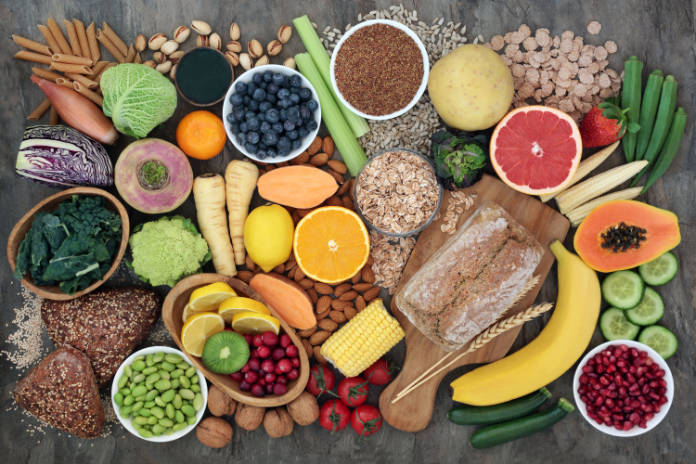
It’s often referred to as two different types – soluble and insoluble. “Soluble fibre is generally thought to have more effect in your small bowel, and insoluble fibre in your large bowel,” Puri continues.
“However, many scientific organisations argue that this picture is no longer clear-cut and, as a result, these terms are being phased out. You may still see these terms being used, but what’s really important to remember is to eat a variety of different fibre-containing foods.”
Why is fibre important for health?
Experts say fibre is responsible for keeping us full throughout the day, keeping our digestion regular, and even protecting us from some major health issues down the line. It’s also very important for general gut health and microbiome, which supports multiple functions throughout the body and brain.
“Fibre has lots of important roles in our body, including keeping our bowels regular and our microbiome healthy, reducing the amount of saturated fat we absorb from our diet, regulating our blood sugars and keeping us feeling full after meals,” says dietitian Sophie Medlin (@sophiedietitian).

She explains that a high-fibre diet is linked with a reduced chance of developing many common problems such as diverticular disease and irritable bowel syndrome, heart disease, diabetes and even weight problems.
As well as protecting your health, it can also make going to the toilet more comfortable too. “Fibre bulks up stools, makes them softer and easier to pass, moving waste through the digestive tract more quickly,” says Puri.
How can I eat more fibre?
Here, experts share some simple strategies for boosting your fibre intake.
1. Prioritise breakfast
“Kick off the day with a high-fibre breakfast like porridge, Shredded Wheat or whole-wheat cereals,” advises Puri.
Not only will this set you on track to hitting your nutrition goals, but it will help keep you full until lunchtime.
View this post on Instagram
2. Snack on fruit
Getting your five-a-day is a great way to keep on top of your fibre intake. “Replace unhealthy snacks with fresh fruit and veg, oatcakes or unsalted seeds and nuts,” suggests Puri.
3. Switch to brown versions
As a general rule, white carbs are lower in fibre than their brown or wholemeal alternatives.
“For example, wholemeal or granary bread typically has higher fibre than white bread,” notes Puri. “Similarly, brown rice and pasta will normally be higher in fibre than the white alternatives, so consider making the swap next time you’re at the supermarket.”
View this post on Instagram
4. Leave the skins on your spuds
If you’re cooking potatoes, Puri says leaving their skins on will increase the fibre content on your plate. Simply give them a scrub before cooking.
5. Sprinkle some seeds
“Seeds are high in fibre, and you can sprinkle them onto soups, salads, breakfasts and avocado,” says Medlin, who adds that they give a delicious nutty crunch to dishes too.
6. Pulse it out
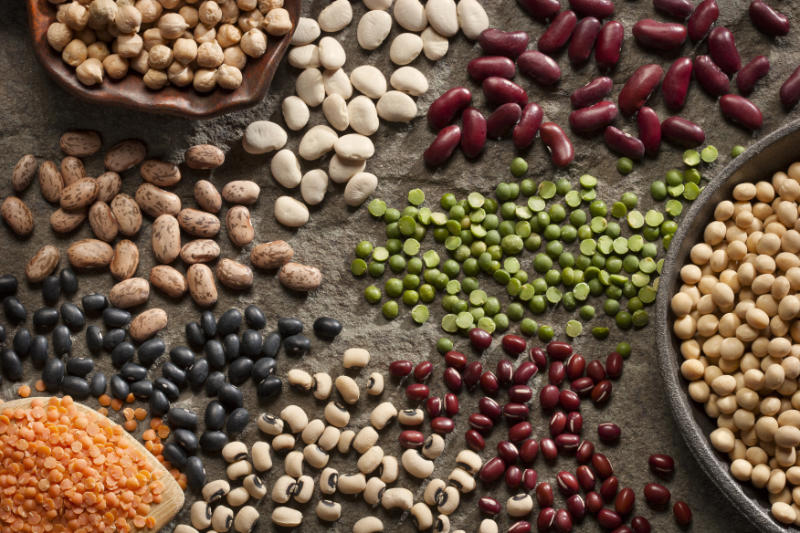
In recent years, there’s been a general shift towards having more meat-free days, both for environmental and health reasons – and beans and pulses are a great way to bulk out plant-based meals.
“Pulses like beans, chickpeas and lentils are good fibre providers. You could try using these instead of meat in dishes like stews or curries,” says Benelam.
Bottom line? Many of us need to eat more fibre and have fewer added sugars in our diet, so prioritising wholefoods over processed convenience foods is a good aim. If you’re struggling to follow a high-fibre diet or concerned you’re not getting enough, speak to your doctor or a pharmacist.
Best-selling fibre supplements
Want to increase you fibre intake? Check out our list of best-selling fibre supplements
- FIBRE SUPPLEMENT – Fibre is essential for our gut to work properly. It feeds the good bacteria in the large intestine, which helps have a diverse and healthy microbiome (range of gut bacteria). Each...
- FIBRE SUPPLEMENTS FOR WOMEN & MEN – Psyllium, also known as Ispaghula, is a form of soluble fibre made from the husks of Plantago Ovata seeds. It is commonly used for digestive health as it's...
- PSYLLIUM HUSK CAPSULES WITH PROBIOTIC – Our unique fiber supplements formula contains 2 million CFU of probiotic acidophilus per two capsule serving, there are 60 servings per bottle which will last...
- ✔︎ WHY BUY NUTRAVITA’S PSYLLIUM HUSK CAPSULES? - Our Psyllium Husk supplement contains 100% pure, high grade psyllium husk powder that is derived from the seeds of Indian Plantago ovata plant,...
- ✔︎ NATURAL SOURCE OF SOLUBLE FIBRE - Not all fibers are the same. Psyllium or Ispaghula is a form of soluble fiber often referred to as bulking fibre because of its excellent water solubility. It...
- ✔︎ PURE PSYLLIUM HUSK POWDER IN EACH CAPSULE - Our fiber supplement has NO fillers or excipients, NO magnesium stearate or silicon dioxide, just 100% psyllium husk fibre to promote regularity and...
- HIGH STRENGTH 1400MG PER SERVING - Our Psyllium Husk supplement contains 100% natural, high grade psyllium husk fibre powder that is derived from the seeds of Indian Plantago ovata plant, It is...
- NATURAL SOURCE OF SOLUBLE FIBRE - Not all fibers are equal. Our High Strength Psyllium fibre supplement is a form of soluble fibre often referred to as bulking fibre because of its excellent water...
- AIDS DIGESTION AND GUT HEALTH - As a natural prebiotic and highly soluble fibre it feeds your gut bacteria and helps promote a healthy digestive system as part of a healthy diet. Helping promote a...
- Holland & Barrett High Fibre Blend 90 Capsules
- ✓ NATURALLY HIGH IN SOLUBLE FIBRE - Solgar Psyllium Husks Fibre is a soluble fibre offering a convenient and easy way to increase the amount of this important food group in our diet to help restore...
- ✓ WORKS WITH YOUR DAILY RHYTHM - With today’s modern lifestyles and diets, it can sometimes be difficult to obtain enough fibre from our food. As well as making sure we eat enough whole grains,...
- ✓COMMITTED TO SUSTAINABILITY - For over 70 years we've used 100% recyclable amber glass bottles
- A high quality multi-fibre formula in easy-to-take capsules
- High fibre food and herbal ingredients
- With psyllium husk and sugar beet
- QUICK & EASY DAILY FIBRE : 10g Fibre Boost = 1/3 of your NHS recommended 30g fibre per day. 5g fibre per 1 Level tablespoon serving, take up to 2 per day for 10g fibre (10g= 10000mg) Adults, children...
- LOVE YOUR GUT : Unique 4in1 dietary fibre blend : Chicory Root Inulin Prebiotics, Psyllium Husk Powder, Pea & Acacia. Insoluble + Soluble fibre. Nutritionist formulated to nourish good gut bacteria in...
- AWARD-WINNING GUT HEALTH SUPPLEMENT : Fiber can aid digestion, help keep you moving & regular. Gentle stool softener, natural laxative for constipation relief. Feel lighter, less bloated, restore...
Last update on 2024-04-10 / Affiliate links / Images from Amazon Product Advertising API
You may be interested in…
This article may include affiliate links to products and services where we may receive a small fee to support the running of this site if you make a purchase or is a sponsored article from one of our select editorial partners providing valuable advice and information to our readers.























































